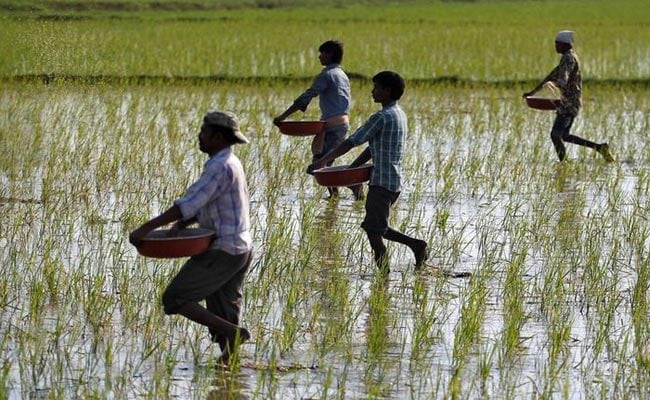
Farmers in India are vulnerable to climate change, says a study (Reuters)
Los Angeles:
At least 59,000 farmers have committed suicide in the last 30 years in India after their crops failed due to climate change, a study by researchers at the University of California, Berkeley, said. Farmer suicide rate in India will rise as global temperature also gradually increases, the study said.
The researchers said farmers pushed into extreme poverty by failing harvests are likely to commit suicide. "It was both shocking and heart breaking to see that thousands of people face such bleak conditions that they are driven to harm themselves," said Tamma Carleton, researcher at UC Berkeley.
The study said temperature increase of just one degree a day during the growing season leads to roughly 65 suicides across India - whenever that day's temperature is above 20 degree Celsius. A temperature rise of five degree Celsius a day has five times that effect, the researchers said.
"But learning that the desperation is economic means that we can do something about this. The right policies could save thousands," Ms Carleton said.
While high temperature and low rainfall during the growing season substantially drive farmers to commit suicide, similar natural events have no effect on farmers during off-season when few crops are grown, hence implicating agriculture as the critical link.
The study, published in the journal Proceedings of the National Academy of Sciences, helps explain India's evolving farmer suicide issue, where suicide rate has nearly doubled since 1980.
The study results indicate that seven per cent of this upward trend can be attributed to warming that has been linked to human activity, the researchers said. Over 75 per cent of suicides in the world are believed to be happening in developing nations, with one-fifth of those in India alone, they said.
The study said global warming - forecast to rise three degree Celsius by 2050 - is already taking a toll on India. More than half of India's working population is employed in rain-dependent agriculture, long known to be sensitive to climate fluctuations such as unpredictable monsoon, heat waves and drought. A third of India's workers already earn below the international poverty line.
Ms Carleton tested the links between climate change, crop yields and suicide by pairing the numbers for India's reported suicides in each of its 32 states between 1967 and 2013, using data from the National Crime Records Bureau, along with statistics on India's crop yields and high-resolution climate data.
To isolate the types of climate shocks that damage crops, Ms Carleton focused on temperature and rainfall during June through September, a critical period for crop productivity that is based on the average arrival and departure dates of summer monsoon.
The researchers said farmers pushed into extreme poverty by failing harvests are likely to commit suicide. "It was both shocking and heart breaking to see that thousands of people face such bleak conditions that they are driven to harm themselves," said Tamma Carleton, researcher at UC Berkeley.
The study said temperature increase of just one degree a day during the growing season leads to roughly 65 suicides across India - whenever that day's temperature is above 20 degree Celsius. A temperature rise of five degree Celsius a day has five times that effect, the researchers said.
"But learning that the desperation is economic means that we can do something about this. The right policies could save thousands," Ms Carleton said.
While high temperature and low rainfall during the growing season substantially drive farmers to commit suicide, similar natural events have no effect on farmers during off-season when few crops are grown, hence implicating agriculture as the critical link.
The study, published in the journal Proceedings of the National Academy of Sciences, helps explain India's evolving farmer suicide issue, where suicide rate has nearly doubled since 1980.
The study results indicate that seven per cent of this upward trend can be attributed to warming that has been linked to human activity, the researchers said. Over 75 per cent of suicides in the world are believed to be happening in developing nations, with one-fifth of those in India alone, they said.
The study said global warming - forecast to rise three degree Celsius by 2050 - is already taking a toll on India. More than half of India's working population is employed in rain-dependent agriculture, long known to be sensitive to climate fluctuations such as unpredictable monsoon, heat waves and drought. A third of India's workers already earn below the international poverty line.
Ms Carleton tested the links between climate change, crop yields and suicide by pairing the numbers for India's reported suicides in each of its 32 states between 1967 and 2013, using data from the National Crime Records Bureau, along with statistics on India's crop yields and high-resolution climate data.
To isolate the types of climate shocks that damage crops, Ms Carleton focused on temperature and rainfall during June through September, a critical period for crop productivity that is based on the average arrival and departure dates of summer monsoon.
Track Latest News Live on NDTV.com and get news updates from India and around the world

